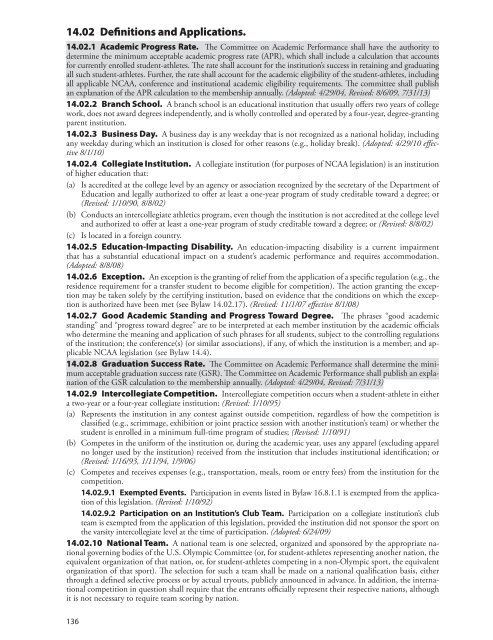ncaa-manual
ncaa-manual
ncaa-manual
- No tags were found...
You also want an ePaper? Increase the reach of your titles
YUMPU automatically turns print PDFs into web optimized ePapers that Google loves.
14.02 Definitions and Applications.14.02.1 Academic Progress Rate. The Committee on Academic Performance shall have the authority todetermine the minimum acceptable academic progress rate (APR), which shall include a calculation that accountsfor currently enrolled student-athletes. The rate shall account for the institution’s success in retaining and graduatingall such student-athletes. Further, the rate shall account for the academic eligibility of the student-athletes, includingall applicable NCAA, conference and institutional academic eligibility requirements. The committee shall publishan explanation of the APR calculation to the membership annually. (Adopted: 4/29/04, Revised: 8/6/09, 7/31/13)14.02.2 Branch School. A branch school is an educational institution that usually offers two years of collegework, does not award degrees independently, and is wholly controlled and operated by a four-year, degree-grantingparent institution.14.02.3 Business Day. A business day is any weekday that is not recognized as a national holiday, includingany weekday during which an institution is closed for other reasons (e.g., holiday break). (Adopted: 4/29/10 effective8/1/10)14.02.4 Collegiate Institution. A collegiate institution (for purposes of NCAA legislation) is an institutionof higher education that:(a) Is accredited at the college level by an agency or association recognized by the secretary of the Department ofEducation and legally authorized to offer at least a one-year program of study creditable toward a degree; or(Revised: 1/10/90, 8/8/02)(b) Conducts an intercollegiate athletics program, even though the institution is not accredited at the college leveland authorized to offer at least a one-year program of study creditable toward a degree; or (Revised: 8/8/02)(c) Is located in a foreign country.14.02.5 Education-Impacting Disability. An education-impacting disability is a current impairmentthat has a substantial educational impact on a student’s academic performance and requires accommodation.(Adopted: 8/8/08)14.02.6 Exception. An exception is the granting of relief from the application of a specific regulation (e.g., theresidence requirement for a transfer student to become eligible for competition). The action granting the exceptionmay be taken solely by the certifying institution, based on evidence that the conditions on which the exceptionis authorized have been met (see Bylaw 14.02.17). (Revised: 11/1/07 effective 8/1/08)14.02.7 Good Academic Standing and Progress Toward Degree. The phrases “good academicstanding” and “progress toward degree” are to be interpreted at each member institution by the academic officialswho determine the meaning and application of such phrases for all students, subject to the controlling regulationsof the institution; the conference(s) (or similar associations), if any, of which the institution is a member; and applicableNCAA legislation (see Bylaw 14.4).14.02.8 Graduation Success Rate. The Committee on Academic Performance shall determine the minimumacceptable graduation success rate (GSR). The Committee on Academic Performance shall publish an explanationof the GSR calculation to the membership annually. (Adopted: 4/29/04, Revised: 7/31/13)14.02.9 Intercollegiate Competition. Intercollegiate competition occurs when a student-athlete in eithera two-year or a four-year collegiate institution: (Revised: 1/10/95)(a) Represents the institution in any contest against outside competition, regardless of how the competition isclassified (e.g., scrimmage, exhibition or joint practice session with another institution’s team) or whether thestudent is enrolled in a minimum full-time program of studies; (Revised: 1/10/91)(b) Competes in the uniform of the institution or, during the academic year, uses any apparel (excluding apparelno longer used by the institution) received from the institution that includes institutional identification; or(Revised: 1/16/93, 1/11/94, 1/9/06)(c) Competes and receives expenses (e.g., transportation, meals, room or entry fees) from the institution for thecompetition.14.02.9.1 Exempted Events. Participation in events listed in Bylaw 16.8.1.1 is exempted from the applicationof this legislation. (Revised: 1/10/92)14.02.9.2 Participation on an Institution’s Club Team. Participation on a collegiate institution’s clubteam is exempted from the application of this legislation, provided the institution did not sponsor the sport onthe varsity intercollegiate level at the time of participation. (Adopted: 6/24/09)14.02.10 National Team. A national team is one selected, organized and sponsored by the appropriate nationalgoverning bodies of the U.S. Olympic Committee (or, for student-athletes representing another nation, theequivalent organization of that nation, or, for student-athletes competing in a non-Olympic sport, the equivalentorganization of that sport). The selection for such a team shall be made on a national qualification basis, eitherthrough a defined selective process or by actual tryouts, publicly announced in advance. In addition, the internationalcompetition in question shall require that the entrants officially represent their respective nations, althoughit is not necessary to require team scoring by nation.136


